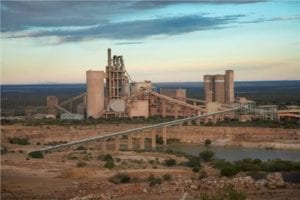AfriSam’s Ulco Cement operation in the Northern Cape Province received the 2013 Industrial Award at the recent National Association for Clean Air (NACA) awards ceremony. This was in recognition of Ulco’s contribution to air quality improvement through its multi-million rand bag house project, as well as for the operation’s dust suppression systems to control a wide range of gaseous emissions.
NACA is South Africa’s primary technical and scientific non-governmental body in the area of air quality management. It has more than 500 members derived from companies, consultant firms, local authorities, professionals involved in air quality management and individuals interested in clean air. “The importance of environmental awareness and the realisation of the need to protect the earth and to conserve environmental resources are increasingly recognised worldwide, ”Claudene Moorgas, AfriSam’s environmental manager, says. “Environmental stewardship for our planet and all its resources needs our attention if the world is to survive into the future. AfriSam has consistently led industry standards in environmental stewardship over many years and, for the past two decades, we have been pioneering programmes and projects that improve on systems and processes to ensure the minimum possible impact on the environment.” As part of AfriSam’s continual drive towards good environmental stewardship and in alignment with the company’s environmental policy first published in 1996, the Ulcoplant received ISO 14001 certification in 2001. However, even prior to receiving this accreditation, AfriSam had undertaken to continually improve the environmental performance of the Ulco plant and the Environmental Management System (EMS) through various initiatives. As part of Ulco’s EMS, emissions monitoring determines whether the performance of the plant is in line with the legislated or targeted parameters. This includes monthly fall-out dust monitoring through the use of dust buckets. In June 2013 a Topaz ambient air quality monitor was installed to determine the quality of ambient air at the plant and surrounding community. The unit monitors total suspended particulate, particulate matter 10, 2.5 and 1, as well as wind speed and direction. Other checks include an online continuous emission monitoring unit that constantly monitors carbon dioxide, oxides of nitrogen, benzene, xylene, toluene, sulphur dioxide, nitrogen dioxide, volatile organic compounds, ammonia, hydrochloric acid and hydrogen fluoride. Emission monitoring is also conducted annually by a third party independent service provider who measures and reports on, in addition to these constituents, the heavy metals cadmium, thallium, mercury, arsenic, antimony, lead, chromium, cobalt, copper, manganese, vanadium and nickel.In 2011, AfriSam’s Board of Directors approved the introduction of bag filter technology at Ulco, recognising that this was the most responsible decision to take. A robust technical investigation identified the precise technology required to achieve current and reduced emission targets set for the site and the installation was commissioned in September 2013. The technology ensures that particulate matter emission levels remain below 30mg/Nm3, comfortably meeting legislated requirements for the foreseeable future.
The bag house represents cutting edge technology internationally, with the additional benefits of reducing power consumption and providing good bag service life by minimising stress on the bags, which are guaranteed to achieve an international best practice service life of five years. This is a major advance on conventional bag life and will translate into significant cost savings. “The state-of-the-art bag house at Ulco is one of numerous new environmental benchmarks AfriSam has contributed to the industry,” Moorgas comments. “We firmly believe that it’s not just about complying with legislation, but also about going the extra mile today to protect and sustain the environment for future generations.”







